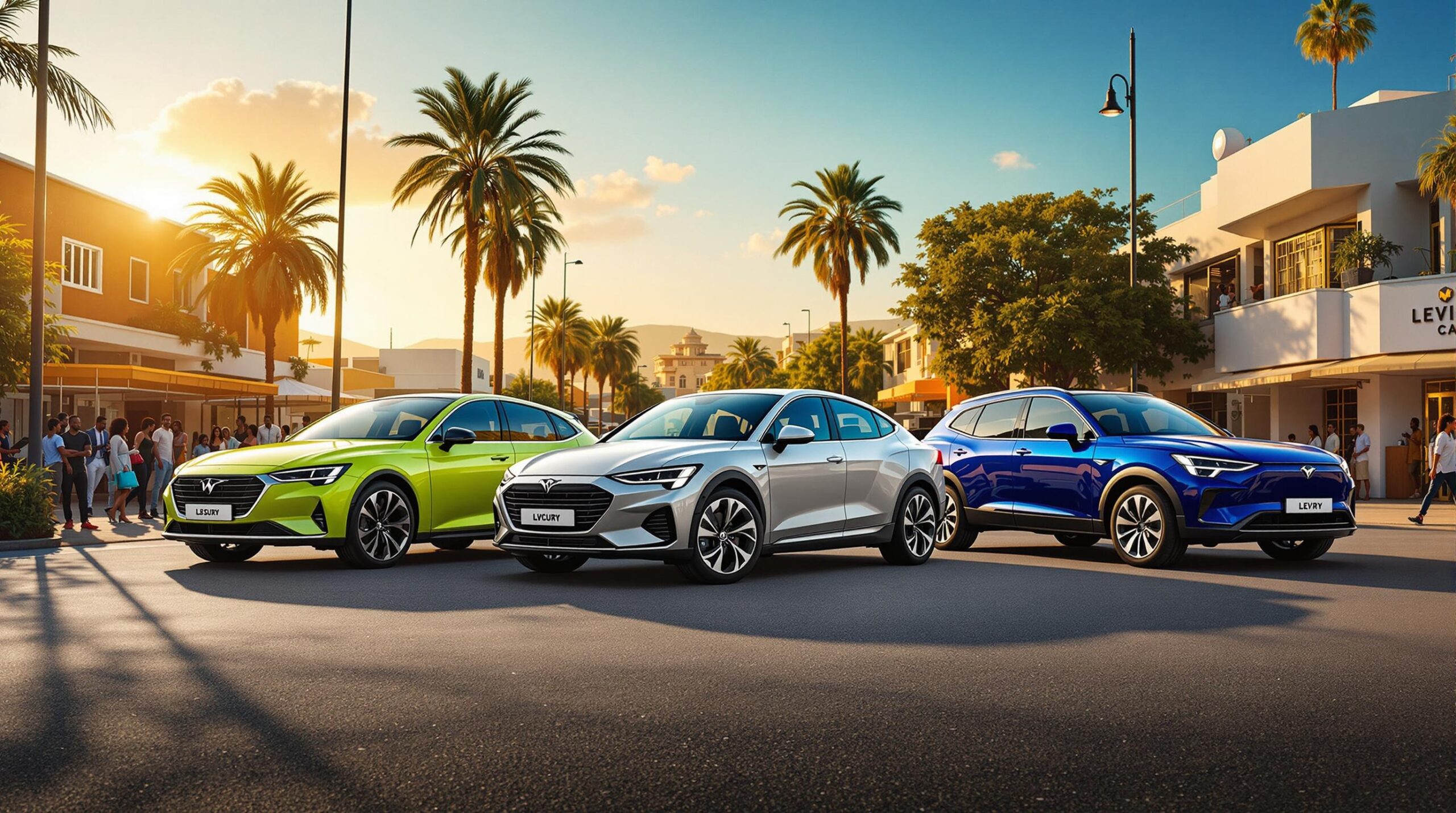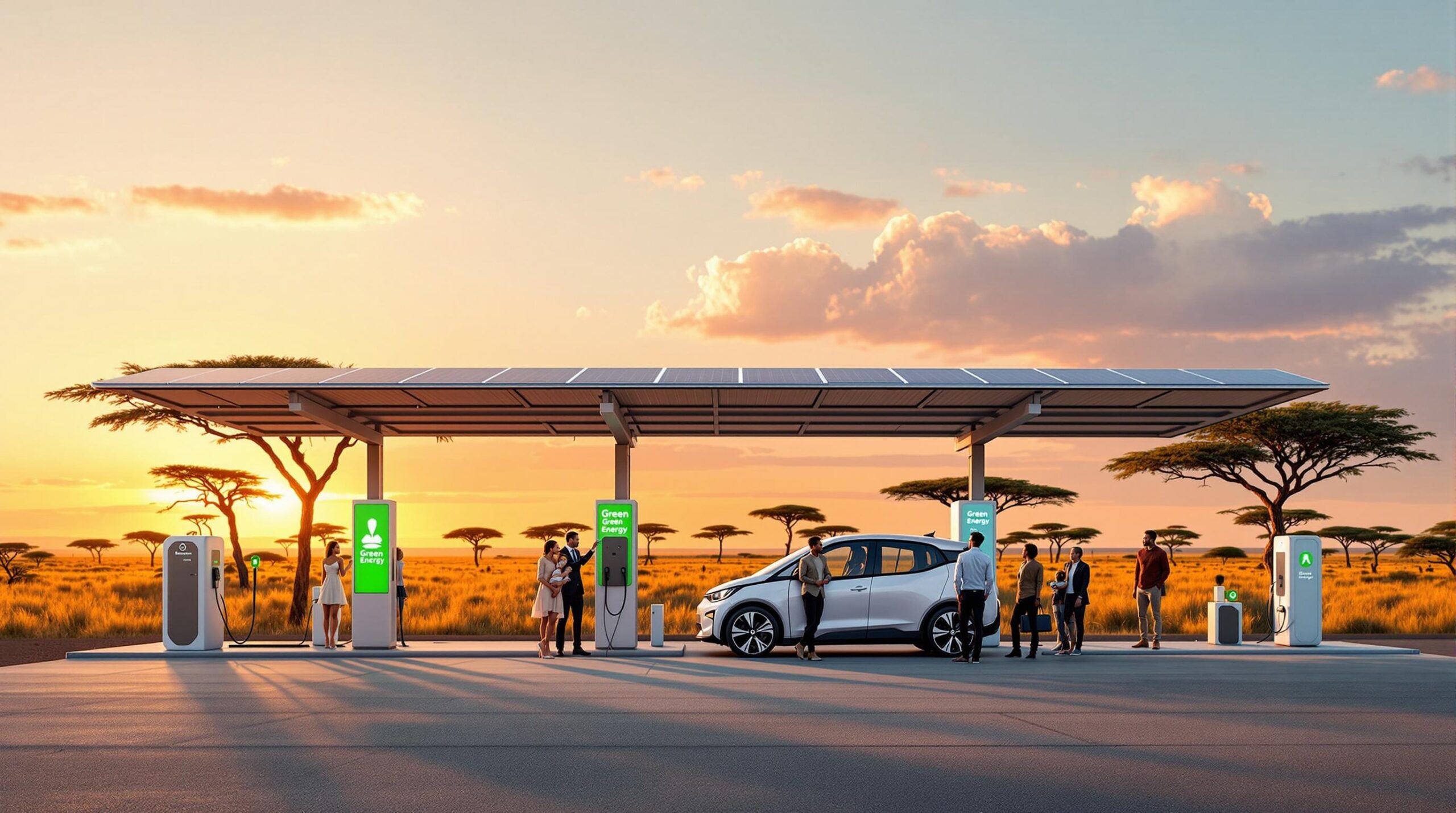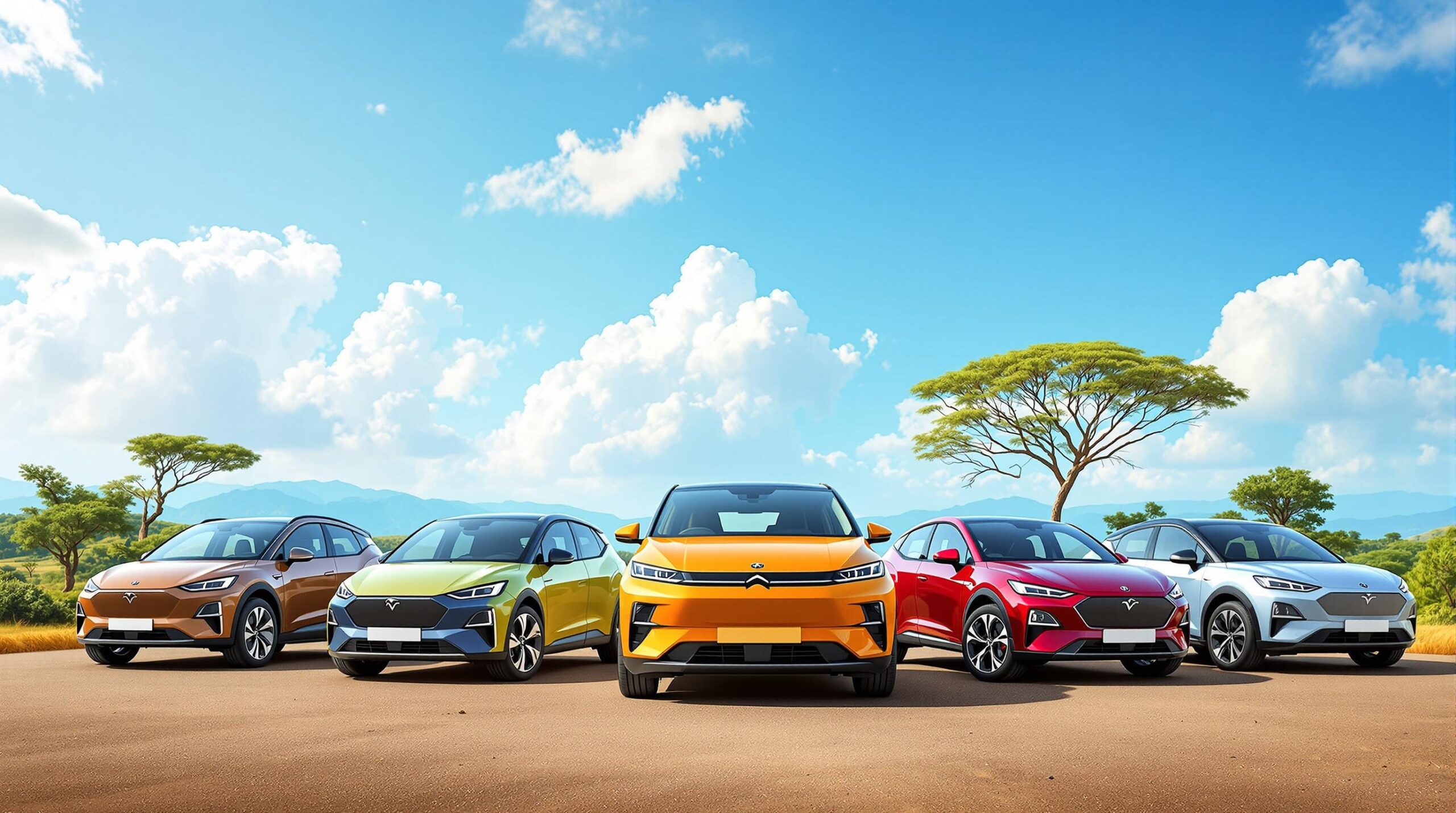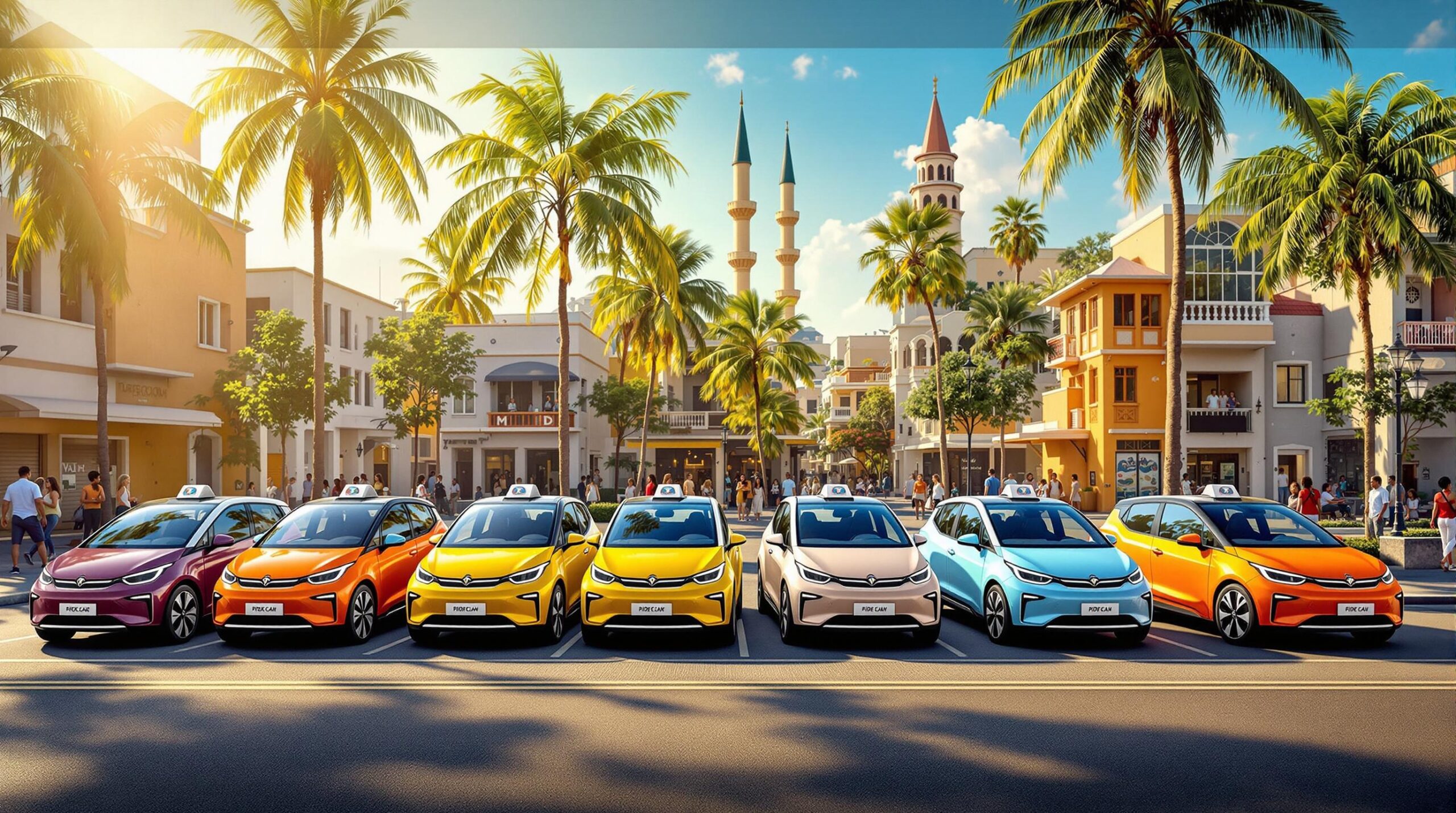
Electric vehicles (EVs) are transforming ride-hailing in Africa, offering lower operating costs, reduced fuel expenses, and eco-friendly benefits. Key features like long range (250-400 km per charge), fast charging, and durability for rough roads make these EVs ideal for African cities. Here’s a quick overview of the top models:
- BYD Atto 3: Long 420 km range, fast charging in 29 minutes, $40,000.
- Nissan Leaf: Proven reliability, 364 km range, affordable at $30,000–$35,000.
- Volkswagen e-Golf: Compact with 230-240 km range, pre-owned options available.
- Dongfeng Nano Box: Budget-friendly at $10,000-$12,000, 200-250 km range.
- Geely Geometry C: Premium SUV with up to 450 km range, $32,000.
- Hyundai Kona Electric: Flexible range options (305-484 km), advanced cooling.
- ROX Motor City EV: Affordable at $15,000-$20,000, 200-250 km range.
- Suzuki e-Survivor (Concept): Compact, durable design for tough roads, $20,000-$25,000.
Quick Comparison Table
| Model | Price (USD) | Range (km) | Charging Time (0-80%) | Best For |
|---|---|---|---|---|
| BYD Atto 3 | $40,000 | 420 | 29 min (DC) | Long shifts, durability |
| Nissan Leaf | $30,000–$35,000 | 364 | 40-60 min (DC) | Affordable, urban trips |
| Volkswagen e-Golf | Varies (Pre-owned) | 230-240 | 45 min (DC) | Budget-friendly fleets |
| Dongfeng Nano Box | $10,000-$12,000 | 200-250 | 30-40 min (DC) | Low-cost, city driving |
| Geely Geometry C | $32,000 | 400-450 | 36 min (DC) | Premium comfort, efficiency |
| Hyundai Kona | $35,000-$40,000 | 305-484 | 47 min (DC) | Range flexibility |
| ROX Motor City EV | $15,000-$20,000 | 200-250 | 30 min (DC) | Budget fleets, easy upkeep |
| Suzuki e-Survivor* | $20,000-$25,000 | 150-200 | Projected | Future-ready, rugged roads |
(*Concept vehicle, specifications subject to change.)
Whether you’re a fleet owner or a driver, these EVs are tailored for Africa’s unique challenges, including rough roads, limited charging infrastructure, and high import costs. Dive into the article for detailed specs, features, and why these models are perfect for ride-hailing in Africa.
Review of The Best Electric Cars in Kenya
Key Features for Ride-Hailing EVs
When choosing electric vehicles for ride-hailing services in Africa, certain features play a big role in ensuring success. These factors help operators strike the right balance between costs and operational needs.
Costs Beyond the Purchase Price
The cost of EVs isn’t just about the sticker price. While initial costs are 20-50% higher than traditional vehicles, EVs offer savings in the long run. Fuel costs drop by 60-70%, and maintenance expenses are cut by 30-50% thanks to fewer moving parts and no oil changes. For ride-hailing businesses that cover a lot of miles, these savings add up quickly.
Range and Charging Needs
Ride-hailing EVs must have enough range to handle long shifts. A minimum range of 250-300 kilometers per charge is ideal, allowing drivers to work 12-16 hours without disruptions. This is especially important in Africa, where charging infrastructure is still developing.
| Charging Solution | Benefits | Considerations |
|---|---|---|
| DC Fast Charging | Quick 30-60 minute top-ups | Limited availability |
| Overnight AC Charging | Full charge during off-hours | Requires secure facilities |
| Battery Swapping | 5-minute swaps | Needs specialized infrastructure |
Built for Tough Roads
African roads can be rough, so vehicles need to be sturdy. Key features include:
- Strong suspension systems
- Higher ground clearance
- Dust and water-resistant parts
- Reinforced underbody protection
- Cooling systems designed for hot climates
Power Supply Challenges
Unreliable electricity grids are a common issue. Solar charging stations and battery storage systems can help bridge the gap. Smart systems also ensure efficient power use during outages.
Easy Maintenance and Repairs
EVs are simpler to maintain, with 90% fewer moving parts compared to gas-powered cars. However, operators still need access to skilled technicians and a reliable supply of spare parts to minimize downtime.
Addressing Import Costs
Import duties can make EVs expensive in African markets. Some countries are taking steps to lower these barriers. For example, Rwanda has removed import taxes on EVs and their components, making them more accessible.
These features are essential when evaluating the compact EVs discussed below.
1. BYD Atto 3
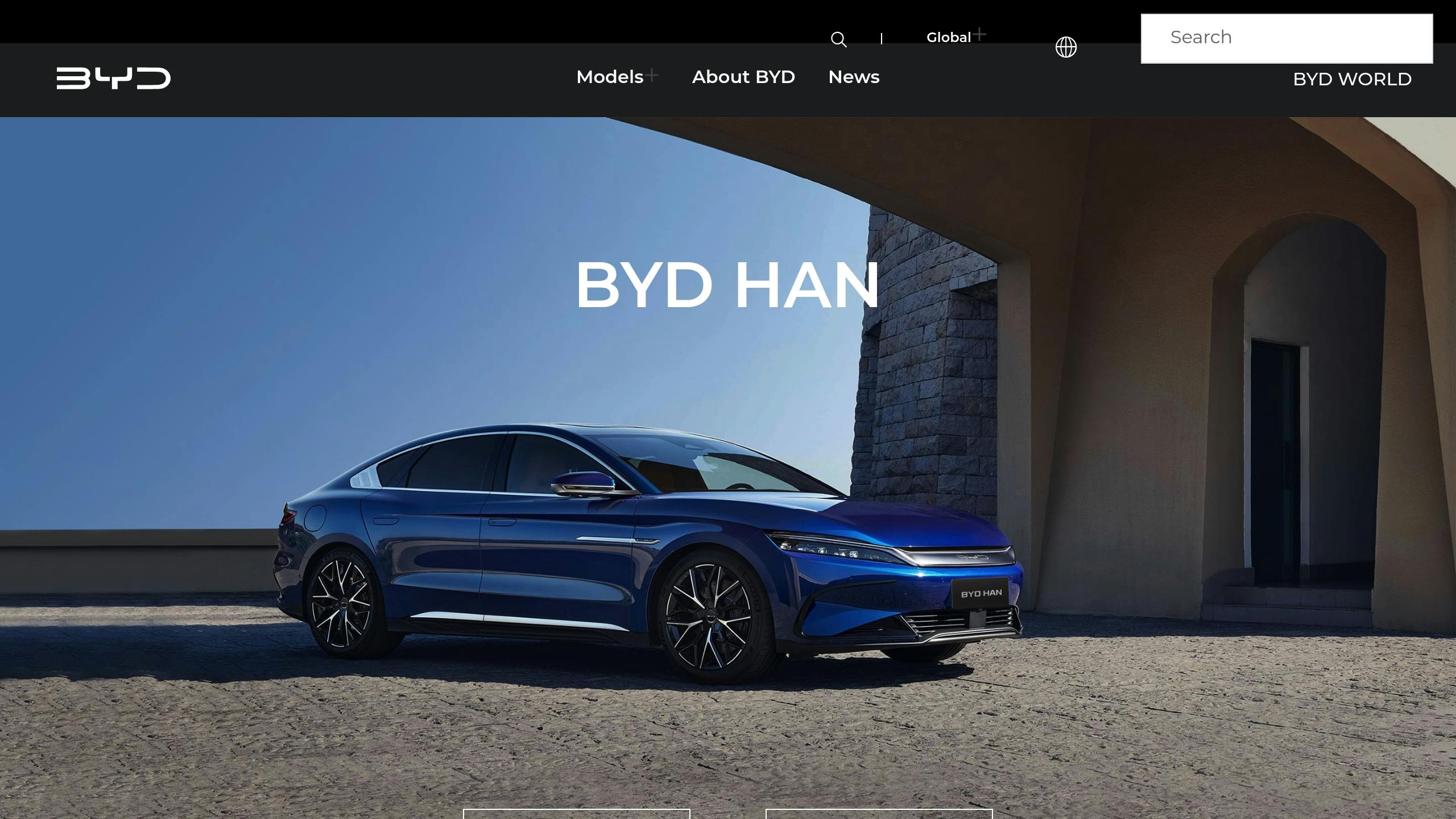
The BYD Atto 3 ticks all the boxes for ride-hailing in Africa, blending modern tech with features suited for the region’s unique needs. With DC fast charging that restores 30-80% of the battery in just 29 minutes, it keeps downtime minimal while offering a solid 420 km range – perfect for full-day use.
Performance and Charging
| Feature | Specification | Benefit for Ride-Hailing |
|---|---|---|
| Range | 420 km (WLTP) | Operates all day without recharging |
| Fast Charging | 30-80% in 29 minutes | Quick recharges between shifts |
| Power Output | 150 kW (201 hp) | Smooth and reliable city driving |
| Battery Capacity | 60.48 kWh | Longer operation without interruptions |
Cost and Warranty Coverage
In South Africa, the Atto 3 is priced at R768,000 (around $40,000 USD), making it a smart choice for ride-hailing businesses. The warranty coverage offsets the upfront cost, offering peace of mind with:
- 6-year/150,000 km vehicle warranty
- 8-year/160,000 km battery warranty
Durability and Safety Features
The Atto 3 is built on a dedicated EV platform with a sturdy chassis designed to tackle Africa’s challenging roads. Its safety-focused battery design is paired with a five-star Euro NCAP safety rating. Key safety features include adaptive cruise control and lane departure warnings, ensuring a secure driving experience.
Practical Features
One standout feature is its ability to charge external devices, giving drivers added flexibility. Inside, a rotating 12.8-inch infotainment screen adds to the comfort and convenience of the ride.
For ride-hailing operators in Africa, the BYD Atto 3 offers a strong mix of range, durability, and modern features, backed by warranties that help safeguard long-term investments.
2. Nissan Leaf
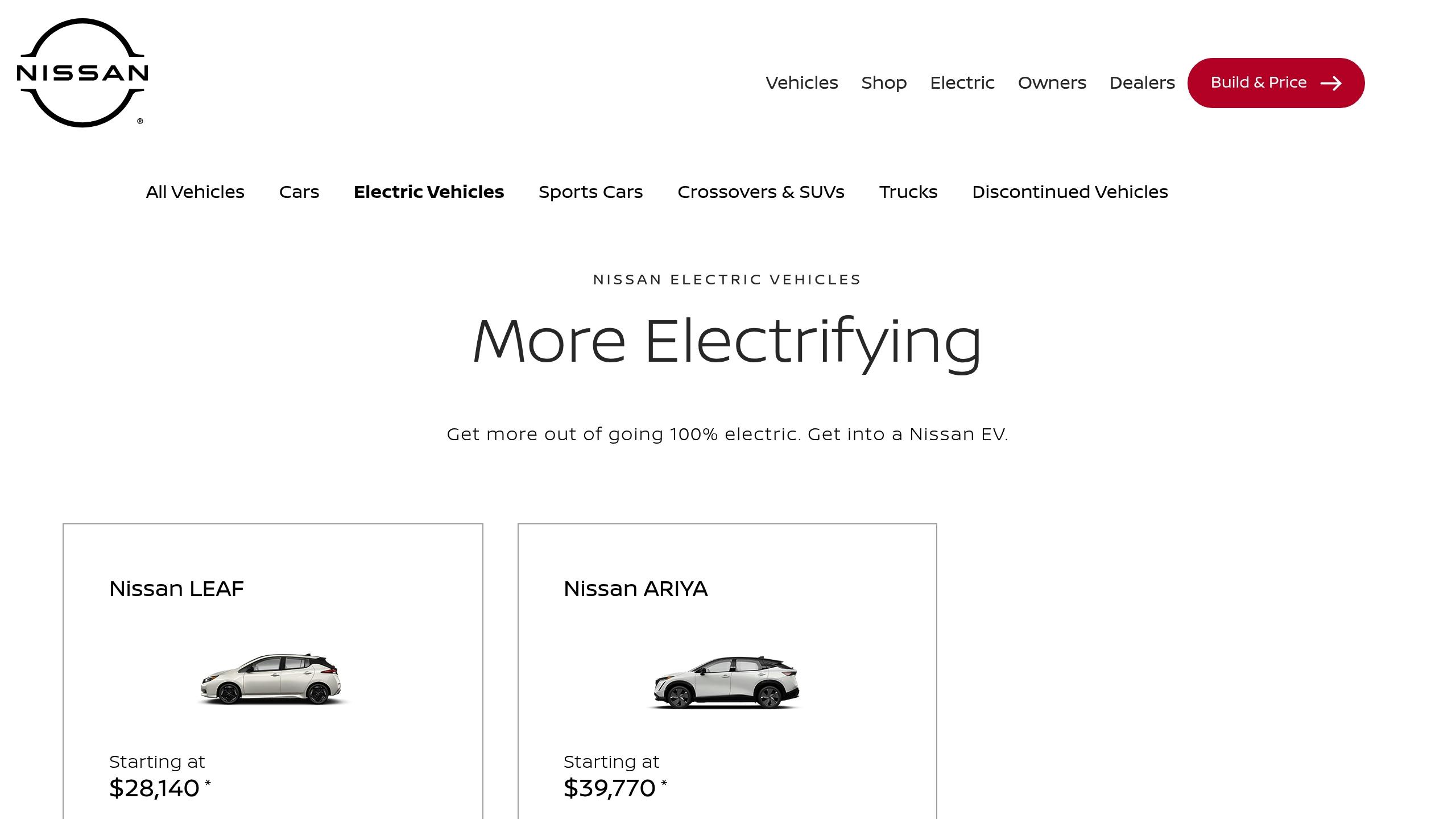
The Nissan Leaf offers an affordable and reliable option for ride-hailing, especially in African markets where it already has a proven track record. The latest e+ model boasts an impressive range of 364 km per charge, making it ideal for multiple trips in a single workday.
Performance and Range Efficiency
| Feature | Specification | Ride-Hailing Benefit |
|---|---|---|
| Range | 364 km | Covers an entire day of urban trips |
| Fast Charging | 80% in 40-60 minutes | Quick recharges between shifts |
| Ground Clearance | 150 mm | Navigates rough urban roads |
Cost-Effective Operations
With a price tag of $30,000–$35,000 USD and annual maintenance costs of $300–$500, the Leaf delivers significant savings – up to 40% compared to gasoline-powered vehicles. Its 150 mm ground clearance ensures it can handle uneven roads, a critical factor for urban ride-hailing.
Urban-Friendly Features
The Leaf’s compact size (4,490 mm in length) makes it perfect for maneuvering through congested city streets. Its regenerative braking system not only extends the vehicle’s range but also reduces wear on brake components, which is a big plus in stop-and-go traffic. Energy-efficient climate control ensures passenger comfort without compromising battery life.
Charging Infrastructure Compatibility
The Leaf supports both CHAdeMO fast charging and Level 2 AC charging, giving operators flexibility to recharge overnight or quickly during the day. This makes it adaptable to Africa’s evolving charging infrastructure.
Safety and Durability
Designed for demanding urban environments, the Leaf includes essential safety features that enhance reliability for ride-hailing:
- Emergency Braking with Pedestrian Detection
- Around View Monitor for better visibility
- Tire Pressure Monitoring System to ensure optimal performance
These features make the Nissan Leaf a practical, low-cost option for urban ride-hailing while maintaining passenger safety and operational efficiency.
3. Volkswagen e-Golf
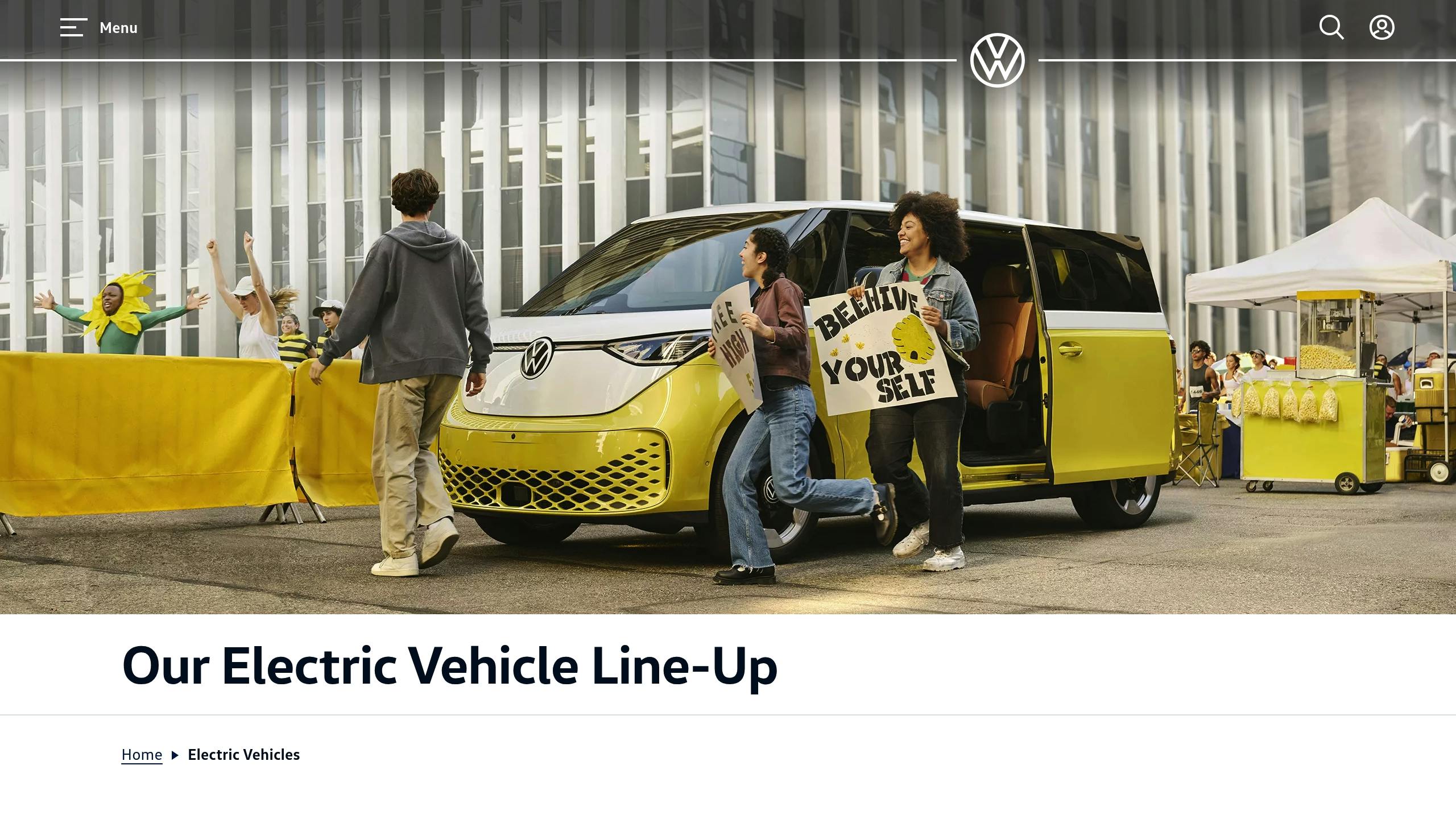
The Volkswagen e-Golf is a dependable option for African ride-hailing, especially when sourced through certified pre-owned programs. With a range of 230-240 km, it comfortably supports full-day urban operations. Plus, its DC fast-charging feature restores 80% of the battery in just 45 minutes. Like the Nissan Leaf, the e-Golf stands out for its reliability, making it a safe choice for operators looking to transition to EV fleets with minimal risk.
Range and Performance Efficiency
The e-Golf has been a reliable performer in Kenya’s EkoRide fleet since 2022, maintaining an impressive 98% uptime. Here’s a quick look at its key specs:
| Feature | Specification | Benefit for Ride-Hailing |
|---|---|---|
| Range | 230-240 km | Covers a full day of city trips |
| Acceleration | 0-100 km/h in 9.6s | Quick response in traffic |
| Fast Charging | 0-80% in 45 minutes | Reduces downtime |
| Battery Capacity | 35.8 kWh | Balances cost and range |
With a 150 mm ground clearance, the e-Golf handles rough urban roads, much like the Nissan Leaf.
Built for City Life
The e-Golf is tailored for the demands of African cities, offering features such as:
- Efficient climate control to handle hot weather
- Regenerative braking for better energy use
- Quiet cabin for a more comfortable passenger experience
- Durable chassis designed to manage potholes in cities like Lagos and Nairobi
Although charging infrastructure remains a hurdle, the e-Golf supports various charging standards, making it adaptable to Africa’s expanding DC fast-charging networks and overnight AC options.
Volkswagen’s growing presence in Africa, with assembly plants in Rwanda and Ghana, further enhances local support. This makes the e-Golf a practical and reliable choice for operators focusing on urban transportation.
4. Dongfeng Nano Box
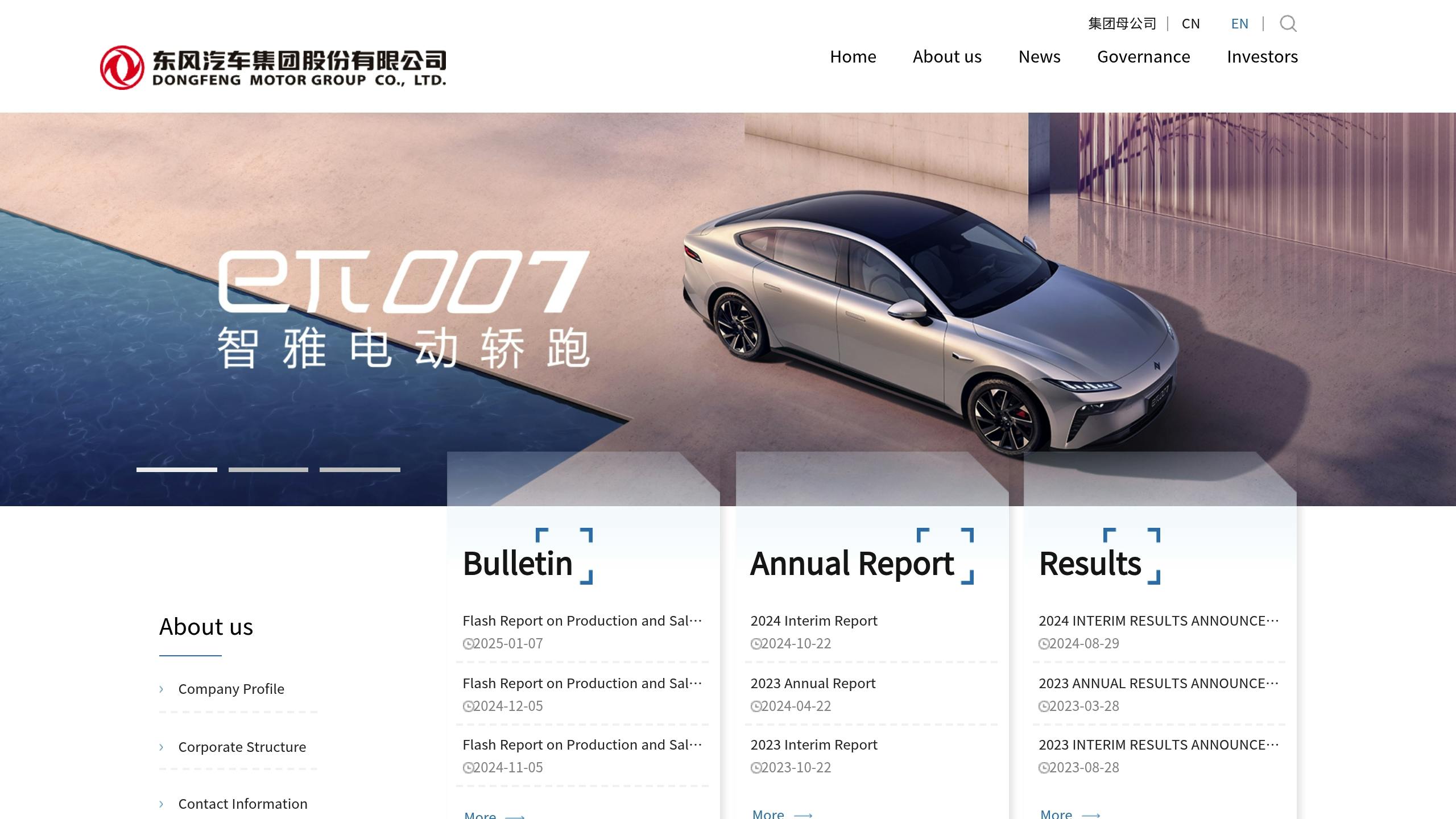
Dongfeng enters the urban EV market with the Nano Box, offering an affordable and practical solution for ride-hailing services. Priced between $10,000 and $12,000, this compact EV provides a range of 200-250 km, making it well-suited for city transportation. Its 3.5m length and 35kW motor strike a balance between easy handling and sufficient power.
Range and Performance
| Feature | Specification | Benefit for Ride-Hailing |
|---|---|---|
| Battery Capacity | 27.2 kWh | Provides a solid mix of range and efficiency |
| Charging Time | 6-8 hours (AC) / 30-40 min (DC 80%) | Convenient overnight charging options |
| Top Speed | 100 km/h | Perfect for city driving needs |
| Ground Clearance | 160 mm | Meets and exceeds recommended clearance for urban roads |
Affordable to Operate
The Nano Box’s simplified electric drivetrain reduces maintenance requirements, keeping operational costs low for ride-hailing drivers.
Tailored for African Roads
Dongfeng has made key adjustments for the African market, including high-temperature cooling systems, dust-protected batteries, and a passenger-friendly 10.1" touchscreen with USB ports.
Maintenance and Support Network
Dongfeng has partnered with 14 dealerships across Africa to ensure reliable maintenance support. Additionally, the company offers training programs for local mechanics, ensuring the vehicle is serviced properly and efficiently.
sbb-itb-99e19e3
5. Geely Geometry C
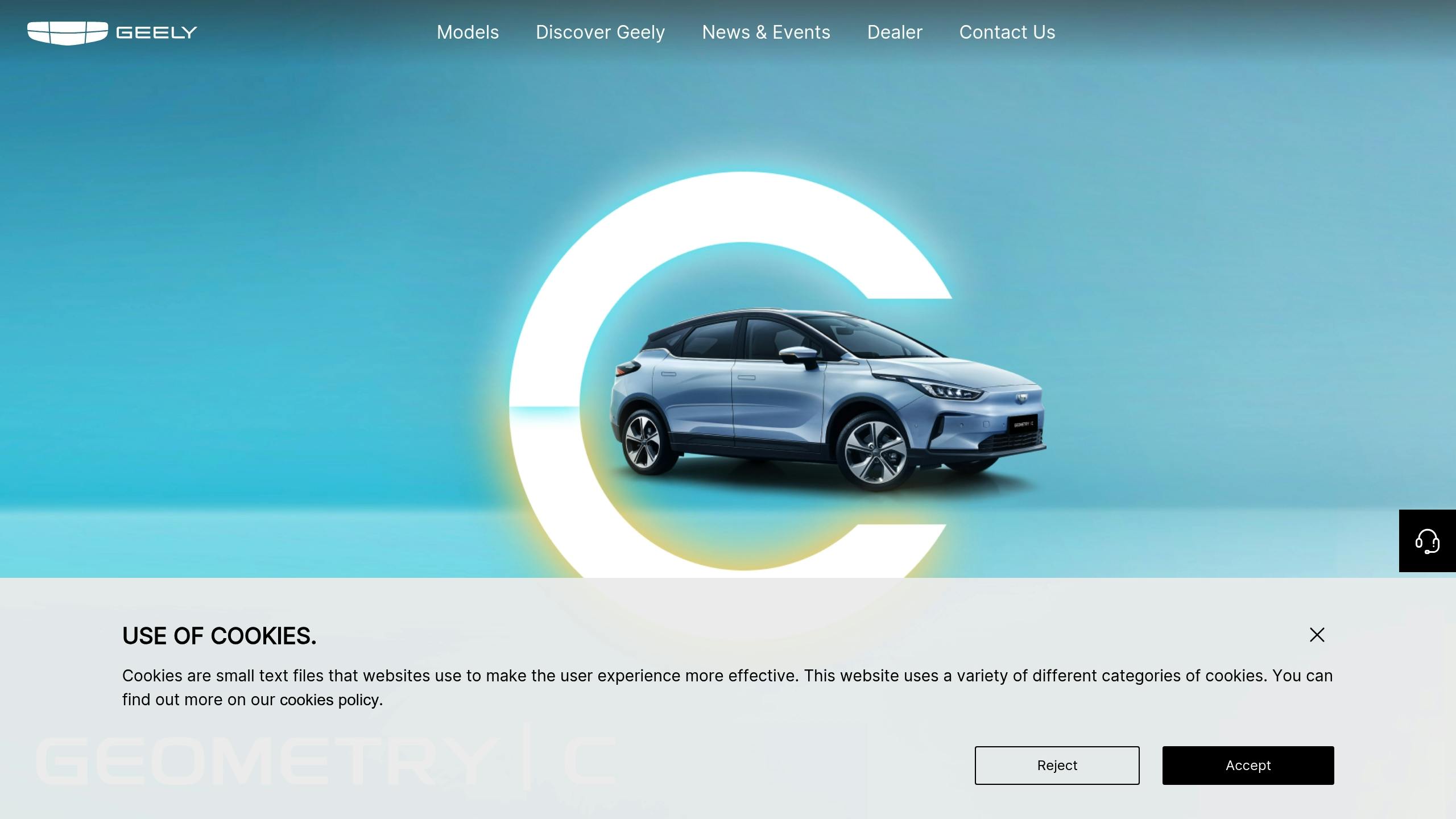
The Geely Geometry C combines premium comfort with efficient performance, offering a practical option for electric ride-hailing services. Starting at around $32,000, this compact SUV balances affordability with high-end features.
Range and Performance Specifications
| Feature | Specification | Benefit for Ride-Hailing |
|---|---|---|
| Battery/Range | 53 kWh (400 km) / 70 kWh (450 km) with 150 kW output | Longer daily operation |
| Energy Efficiency | 13.5 kWh/100km | Reduces operating costs |
Designed for Hot Climates
The Geometry C is built to handle the challenges of hotter regions. Its advanced thermal management system protects the battery in high temperatures, while energy-efficient climate control helps maintain range. A sealed battery compartment and heat pump system tackle both heat and dust, making it well-suited for African cities.
Made for Urban Roads
This SUV’s higher ground clearance makes it easier to navigate uneven roads, a common issue in many cities. It’s also efficient in stop-and-go traffic, and its safety features ensure reliable operation throughout the day.
Smart Features for Drivers
With 360-degree cameras and driver assistance systems, the Geometry C reduces stress in busy urban environments while keeping safety a priority.
6. Hyundai Kona Electric
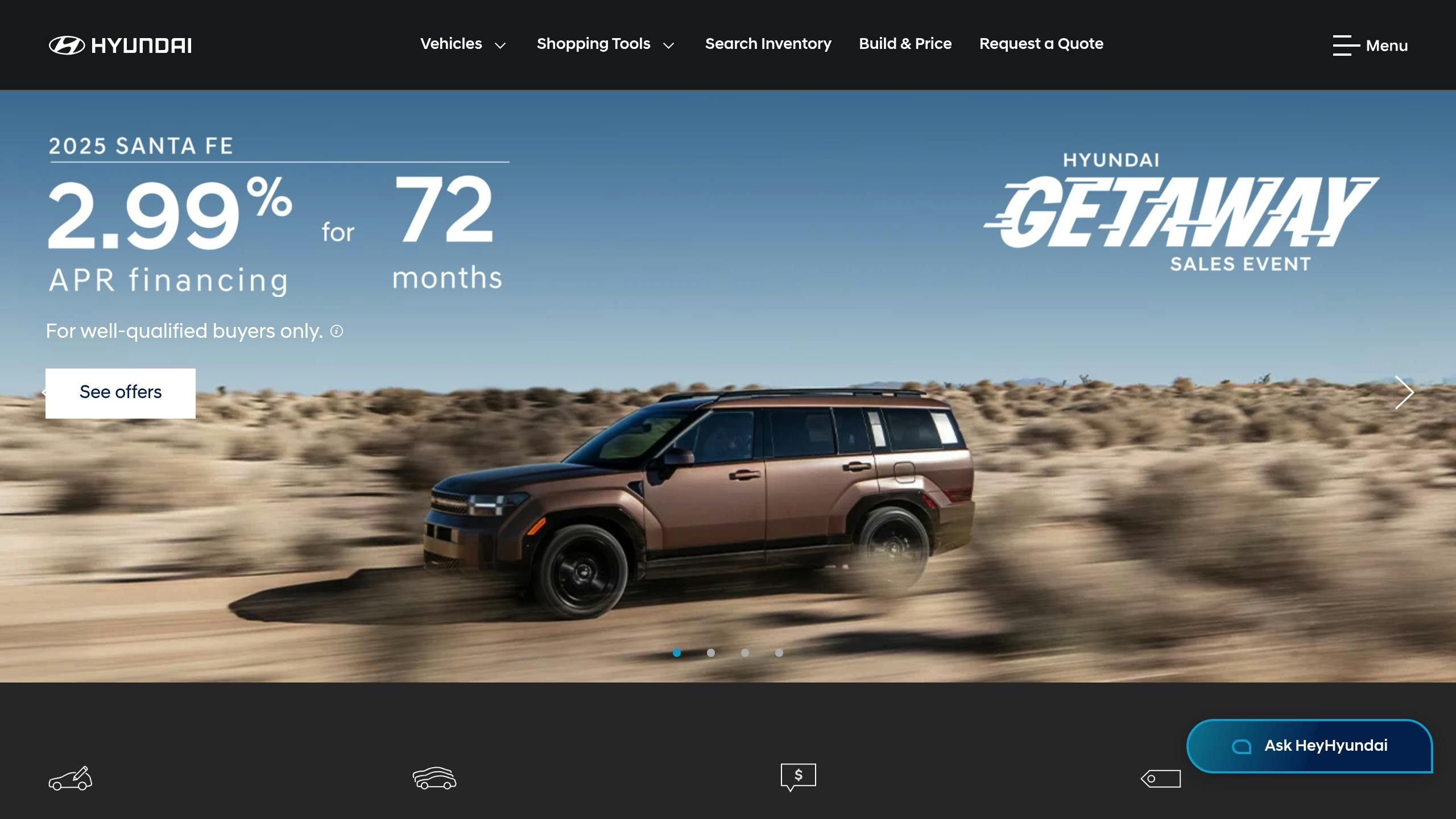
The Hyundai Kona Electric is tailored for African urban settings, taking inspiration from the Geely Geometry C’s climate-focused features.
Performance and Range Specifications
| Feature | Standard Range | Long Range | Ride-Hailing Advantage |
|---|---|---|---|
| Battery Capacity | 39.2 kWh | 64 kWh | Offers range flexibility |
| Maximum Range | 305 km | 484 km | Supports full-day operations |
| Charging Speed | 10-80% in 47 min (100 kW DC) | 10-80% in 47 min (100 kW DC) | Reduces downtime |
| Power Output | 100 kW (134 hp) | 150 kW (201 hp) | Ensures reliable city driving |
Designed for African Urban Conditions
The Kona Electric is equipped with features to tackle the challenges of African cities:
- Advanced Cooling System: Keeps the battery at an ideal temperature in hot weather.
- High Ground Clearance: Handles uneven and challenging road surfaces with ease.
- Efficient Climate Control: Extends range by optimizing energy usage for temperature management.
- Dust-Protected Battery Compartments: Matches the durability standards seen in models like the Dongfeng Nano Box.
Passenger Comfort Features
For ride-hailing services, the Kona Electric prioritizes passenger experience with:
- Rear-seat climate control vents for added comfort
- USB charging ports for device convenience
- A roomy rear seating area, despite its compact design
Safety is also a strong focus, with features like Forward Collision-Avoidance Assist and Lane Keeping Assist, ensuring smooth navigation through busy urban streets in Africa.
7. ROX Motor City EV
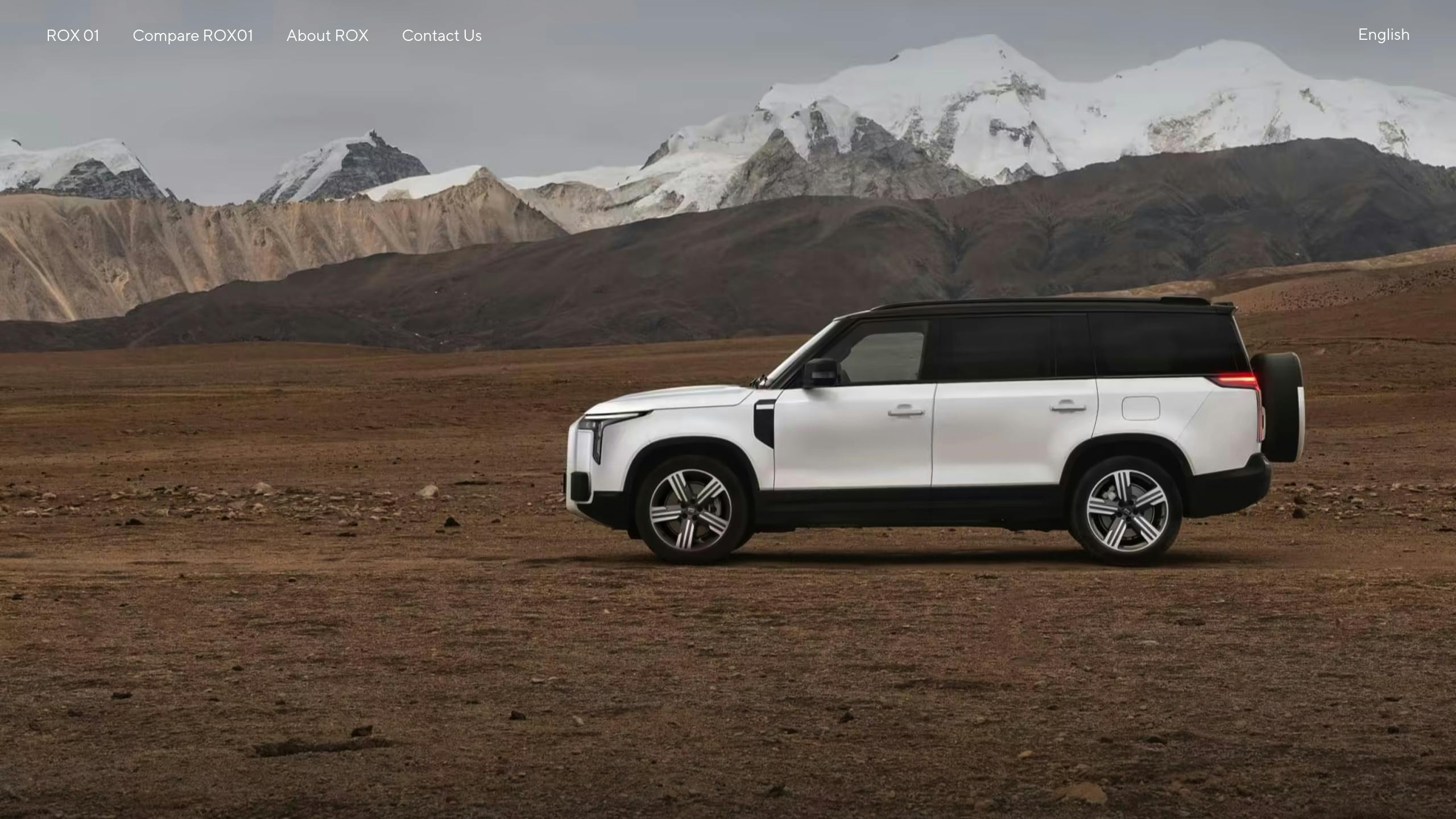
For operators looking for an affordable yet durable option, the ROX Motor City EV stands out as a budget-friendly choice for African ride-hailing businesses. With a price tag of $15,000 to $20,000 USD, it costs 20-30% less than similar electric vehicles on the market.
Performance Specifications
| Feature | Specification | Benefit for Ride-Hailing |
|---|---|---|
| Range | 200-250 km | Ideal for daily city routes |
| Battery Capacity | 30 kWh | Well-suited for urban trips |
| Fast Charging | 20-80% in 30 min | Reduces downtime during shifts |
Designed for Urban Use
The Motor City EV’s compact build is perfect for navigating busy city streets. It also features a powerful air conditioning system and a roomy interior that comfortably seats four passengers.
Lower Operating Costs
A study in Nairobi found that the Motor City EV can cut energy costs per kilometer by up to 40% compared to traditional fuel-powered vehicles. Plus, it comes with a 3-year/100,000 km warranty and mobile support.
Tackling Infrastructure Challenges
ROX has implemented practical solutions to address Africa’s infrastructure limitations:
- Compatibility with portable chargers that work with standard household outlets
- Collaborations with public charging networks
- Heat-resistant battery systems to handle extreme temperatures
Fleet Support Services
ROX partners with top ride-hailing companies in Kenya, South Africa, and Nigeria, offering key services like:
- Technical assistance and driver training
- Quick access to repairs
- Financing options through local banks
With its affordable price, reliable range, and strong support network, the Motor City EV is a smart choice for ride-hailing operators in cities like Nairobi and Lagos. It helps reduce operating costs while ensuring dependable performance for fleet owners transitioning to electric vehicles.
8. Suzuki e-Survivor Concept

The Suzuki e-Survivor is still in the concept stage, but it shows promise for Africa’s ride-hailing market with its tough design and eco-conscious technology. Its small size and high ground clearance make it versatile, offering both urban convenience and off-road capability:
| Specification | Measurement | Advantage for Ride-Hailing |
|---|---|---|
| Length | 3,460 mm | Navigates tight spaces with ease |
| Width | 1,645 mm | Compact for city driving |
| Height | 1,655 mm | Easy for passengers to enter and exit |
| Ground Clearance | 275 mm | Handles rough roads effectively |
Performance and Range
Projections suggest a range of 150-200 km per charge. Although this is below the recommended 250 km minimum for ride-hailing, modular battery systems could provide a solution for fleet operators. Wheel-mounted motors improve traction control, which is crucial for tackling Africa’s varied road conditions.
Charging Compatibility
The e-Survivor supports both AC and DC charging, a vital feature for Africa’s growing charging network.
Pricing and Market Fit
With an estimated price tag of $20,000-$25,000, the e-Survivor aligns with Africa’s mid-range EV segment, making it a potential option for cost-conscious buyers.
Adjustments for Practical Use
To better suit ride-hailing needs, the vehicle will require updates like increased passenger capacity and improved climate control systems.
Built for Tough Conditions
The e-Survivor’s sturdy design includes several features tailored for challenging environments:
- A high-strength frame for durability
- Large off-road tires for better grip
- Experimental visibility enhancements
These elements could help minimize maintenance costs and extend the vehicle’s lifespan in demanding settings.
EV Specs and Price Comparison
Examining the core specs of these EVs highlights standout choices for ride-hailing operators in Africa:
Key comparison metrics for African operators:
| Model | Price (USD, pre-tax) | Range (km) | Fast Charging (0-80%) |
|---|---|---|---|
| BYD Seagull | 10,000-12,000 | 300-350 | 30-40 min |
| Dongfeng Nammi Box | 14,000-16,000 | 250-300 | 40 min |
| Tata Tiago EV | 11,000-13,000 | 250-315 | 60 min |
| Leapmotor T03 | 15,000-18,000 | 403 | 36 min |
| Dacia Spring | 22,000-25,000 | 230 | 50 min |
| Wuling Binguo | 9,000-11,000 | 200-250 | 45 min |
| Changan Lumin | 13,000-15,000 | 220-270 | 35 min |
When comparing these models, three key points stand out:
- Competitive Pricing: EVs from Chinese brands are priced 20-30% lower than their European counterparts.
- Standard Features: Most models come equipped with energy-recapture braking systems and smartphone integration.
- Warranty Coverage: These vehicles typically offer warranties above local standards, with battery warranties often lasting up to 8 years.
Final Thoughts
From the BYD Seagull to the Tata Tiago EV, these eight models highlight how compact EVs can meet the specific needs of ride-hailing in Africa. Models like the Wuling Binguo (priced at $9,000) and Tata Tiago EV strike a balance between affordability and durability, making them suitable for the African market.
The successful adoption of EVs depends heavily on building infrastructure and forming strategic partnerships. As seen in the featured models, features like high ground clearance and reliable cooling systems are crucial for handling Africa’s unique conditions. These approaches support market growth while addressing the evolving demands of ride-hailing operators.
For operators thinking about making the switch, here are some key points to consider:
| Aspect | Current Status | Future Outlook |
|---|---|---|
| Infrastructure | Limited but improving | Growth driven by partnerships |
| Operating Costs | Lower than ICE vehicles | Further reductions with better efficiency |
With charging networks expanding and manufacturers introducing models tailored for African roads, these eight EVs put ride-hailing operators in a strong position to lead the shift toward electric mobility across the continent.


